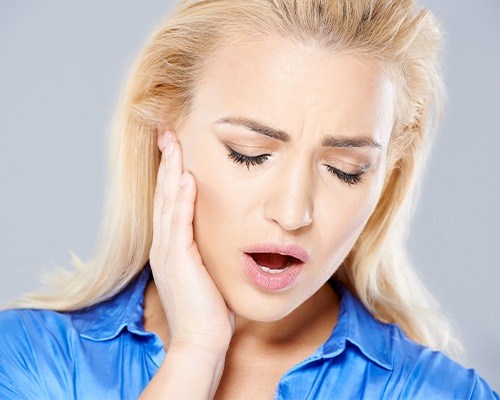Self-Care for TMJ – Las Vegas, NV
Self-Help for TMJ Pain

Do you ever experience any of the following symptoms?
- Persistent pain in your jaw, ears, face, neck, or shoulders
- Headaches or migraines
- Earaches that are NOT due to an infection
- Clicking or popping sounds when you open and close your mouth
- Feeling as if your jaw is locked in place
If you do, then the problem may be a TMJ disorder, also just called TMD. This is an often painful and bothersome condition that happens as a result of dysfunction in your temporomandibular joints, which connect the lower jaw to your skull. Dr. Pam West can provide TMJ therapy in Las Vegas to help alleviate the pain. In addition, she has several suggestions for some self-care practices you can use that might be helpful, too.
Self-Care for TMD

- Just as heat or ice can help alleviate joint and muscle pain throughout the body, the same holds true for your jaw joints. Try applying moist heat for 15 to 20 minutes two to four times a day to the painful area. You can apply an ice pack more often—up to 10 minutes at a time every two hours.
- Watch what you eat. Certain foods are known to aggravate TMD, such as raw carrots, caramels, nuts, and other hard or chewy foods. When eating fruit, be sure to cut bite-sized pieces and roast or steam fresh vegetables. Basically, stay away from any food that causes your jaw to hurt or feel locked. Be sure to chew on both sides of your mouth at the same time so you don’t strain one side more than the other. And don’t chew gum!
- Don’t clench your teeth. As you go through the day, you may not even realize that you are tightening your jaw muscles. To relax your jaw, touch the tip of your tongue to the roof of your mouth while keeping your lips together. This keeps your upper and lower teeth from touching and your jaw can relax.
- Avoid caffeinated beverages like coffee, tea, sodas, energy drinks, and hot chocolate. Caffeine causes muscle tension, which can make your jaw feel tighter. And read the labels! Even drinks that are decaffeinated have a small amount of caffeine.
- Take over-the-counter anti-inflammatory and pain reduction medications according to Dr. West’s instructions.
- Instead of sleeping on your stomach, try moving to your side or your back. Stomach sleeping strains your jaw and neck muscles.
At our sleep center in Las Vegas, Dr. West can also teach you a few exercises and stretches that can be quite helpful for people dealing with TMD. Call the office today to schedule a consultation.
